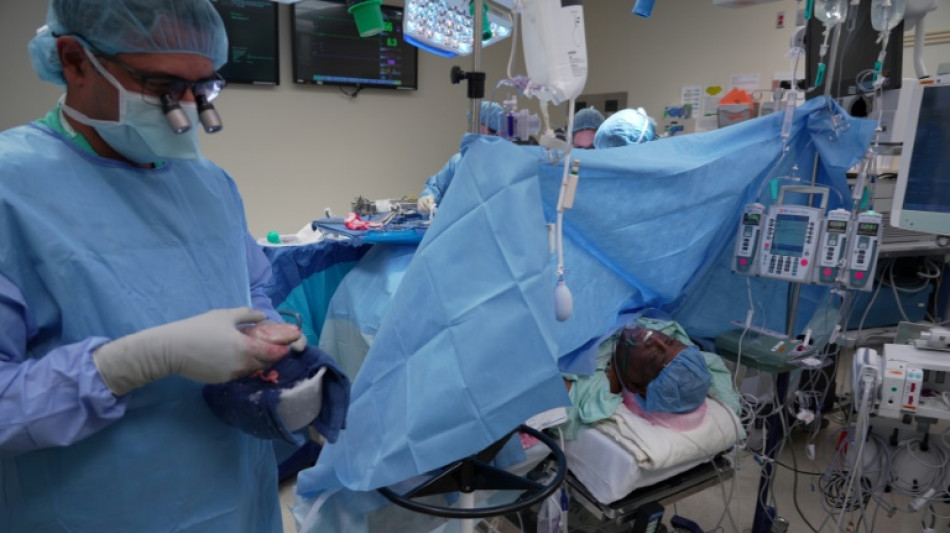
-
 Prince William plays football, volleyball in Rio on climate trip
Prince William plays football, volleyball in Rio on climate trip
-
Jamaicans mobilize aid in aftermath of Melissa's wreckage

-
 Starbucks cedes China control to Boyu Capital
Starbucks cedes China control to Boyu Capital
-
'Wild at Heart' actress Diane Ladd dies at 89

-
 Xhaka lifts Sunderland into fourth after Everton draw
Xhaka lifts Sunderland into fourth after Everton draw
-
Brazil records biggest annual fall in emissions in 15 years: report

-
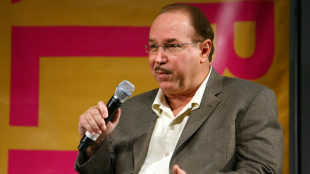 Victor Conte, mastermind of BALCO doping scandal, dead at 75: company
Victor Conte, mastermind of BALCO doping scandal, dead at 75: company
-
Trial opens in 1st US civil case on 2019 Boeing MAX crash

-
 Barrett brothers out of All Blacks' clash with Scotland
Barrett brothers out of All Blacks' clash with Scotland
-
Medieval tower partially collapses in Rome, trapping worker

-
 Arsenal's Arteta says injured Gyokeres out of Slavia Prague tie
Arsenal's Arteta says injured Gyokeres out of Slavia Prague tie
-
Alonso says 'quality' Wirtz helped get him Real Madrid job

-
 US Fed's Cook warns inflation to stay 'elevated' next year
US Fed's Cook warns inflation to stay 'elevated' next year
-
Blue heaven: huge crowds salute Los Angeles Dodgers in victory parade

-
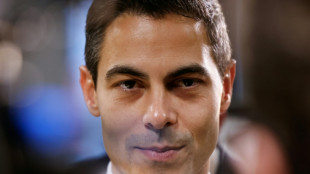 Dutch centrist Jetten clinches election win: final tally
Dutch centrist Jetten clinches election win: final tally
-
Mamdani extends olive branch to anxious NY business community
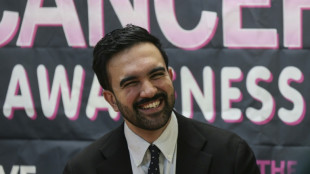
-
 Sierra Leone chimpanzee sanctuary reopens after deforestation protest
Sierra Leone chimpanzee sanctuary reopens after deforestation protest
-
Shein bans sex dolls after France outrage over 'childlike' ones

-
 England full-back Steward doubtful for Autumn rugby clash with Fiji
England full-back Steward doubtful for Autumn rugby clash with Fiji
-
Bayern know how to 'hurt' PSG, says Neuer

-
 Rybakina downs Swiatek to reach WTA Finals last four
Rybakina downs Swiatek to reach WTA Finals last four
-
Ex-France international Ben Yedder to stand trial on rape charges

-
 Djokovic confirmed for ATP Finals, says Italian federation boss
Djokovic confirmed for ATP Finals, says Italian federation boss
-
Trent should be remembered for 'great' Liverpool moments, says Slot

-
 Stock markets diverge despite boost from AI deals
Stock markets diverge despite boost from AI deals
-
Prince William awed by Rio on climate-focused trip to Brazil

-
 Violence in Sudan's El-Fasher could be war crimes, says top court
Violence in Sudan's El-Fasher could be war crimes, says top court
-
Rybakina downs Swiatek in WTA Finals

-
 Turkey, Muslim allies say Palestinian self-rule key to Gaza future
Turkey, Muslim allies say Palestinian self-rule key to Gaza future
-
Tens of thousands shelter as typhoon slams into Philippines

-
 Stock markets rise as tech sector buoyed by fresh AI deal
Stock markets rise as tech sector buoyed by fresh AI deal
-
Vitinha says PSG-Bayern Champions League clash will show who's 'best'

-
 Arsenal: The unstoppable Premier League force?
Arsenal: The unstoppable Premier League force?
-
Denmark inaugurates rare low-carbon hydrogen plant
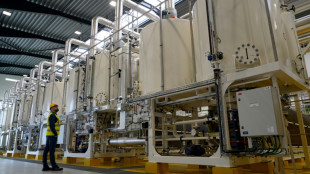
-
 Springboks back Ntlabakanye call-up despite doping probe
Springboks back Ntlabakanye call-up despite doping probe
-
German plans to lower industrial power costs from January

-
 Christian, Muslim Nigerians push back on threatened US strikes
Christian, Muslim Nigerians push back on threatened US strikes
-
Nigeria's Rivers United paired with African champions Pyramids

-
 India women cricketers hail new era but challenges remain
India women cricketers hail new era but challenges remain
-
'Heroic' worker praised as man charged over UK train stabbings

-
 Bangladesh ex-PM Zia to contest elections: party
Bangladesh ex-PM Zia to contest elections: party
-
Tanzania president sworn in as opposition says hundreds killed in protests

-
 India announces $5.75 million reward for women cricket World Cup winners
India announces $5.75 million reward for women cricket World Cup winners
-
Spain regional leader resigns, a year after deadly floods
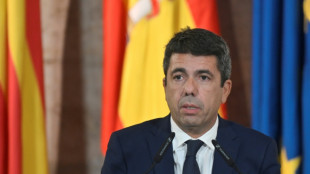
-
 Video game creators fear AI could grab the controller
Video game creators fear AI could grab the controller
-
France threatens Shein ban if 'childlike' sex dolls reappear

-
 International cricket returns to Faisalabad with Pakistan-South Africa ODIs
International cricket returns to Faisalabad with Pakistan-South Africa ODIs
-
Afghan govt says quake kills 20, injures over 500

-
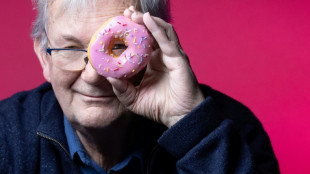 'We're all too rich,' says photo legend Martin Parr
'We're all too rich,' says photo legend Martin Parr
-
Tanzania president inaugurated as opposition says hundreds dead

| RBGPF | -3.95% | 76 | $ | |
| SCS | -0.76% | 15.84 | $ | |
| AZN | -0.83% | 81.72 | $ | |
| NGG | -0.68% | 74.74 | $ | |
| RYCEF | 1.37% | 15.36 | $ | |
| BTI | 2.38% | 52.44 | $ | |
| BCC | -3.15% | 68.34 | $ | |
| RELX | -0.16% | 44.17 | $ | |
| CMSC | -0.34% | 23.67 | $ | |
| GSK | -1.1% | 46.35 | $ | |
| RIO | -1.95% | 70.37 | $ | |
| BCE | -0.84% | 22.67 | $ | |
| JRI | -0.14% | 13.88 | $ | |
| BP | -0.75% | 34.87 | $ | |
| CMSD | -0.38% | 23.9 | $ | |
| VOD | -5.89% | 11.38 | $ |

Could awake kidney transplants become the norm?
"I saw everything," says 74-year-old Harry Stackhouse from Illinois, who was awake during his recent kidney transplant. He felt no pain as he chatted with doctors, examined the donor organ, and watched the surgical team staple him back up.
Stackhouse was discharged just 36 hours after the procedure at Northwestern Medicine, which aims to make transplants without risky general anesthesia commonplace.
Performed in a little over an hour on July 15, this was the second such surgery led by Satish Nadig, director of the Chicago-based hospital system's Comprehensive Transplant Center. He has since carried out a third.
"We're at an inflection point in transplantation today in being able to use the technologies that we have around us to really push us into this next era," Nadig told AFP.
It may sound off-putting or even scary, but the medical benefits of using a spinal anesthetic for kidney transplants -- similar to what's already done during cesarean sections -- are well established.
General anesthesia requires intubation, which can damage the vocal cords, delay bowel function, and cause "brain fog" that persists, particularly in older patients.
But while the medical literature mentions a smattering of awake kidney transplants going back decades across several countries, it's never been fully embraced.
This year marks only the 70th anniversary of the first successful live donor human kidney transplant, Nadig points out, and there's been reluctance to challenge the status quo.
"However, now the outcomes for kidney transplantation are fantastic and it's time that we question the paradigms that we have historically stuck to."
- Life restoring -
Stackhouse, a father-of-six who worked as a painter and decorator, says he first fell ill in December 2019 with flu-like symptoms, which worsened to the point he could barely walk.
A few months later he ended up in the emergency room, where he learned he not only had Covid-19 during the most dangerous early phase of the pandemic, but one of his kidneys had failed and the other was functioning at only two percent.
He resigned himself to thrice-weekly dialysis sessions, but as the ports began failing and his veins started closing up, his daughter Trewaunda urged him to consider a transplant, offering to get herself tested as a donor.
Initially reluctant to "intrude" on his children's lives, Stackhouse finally agreed.
After meeting with Nadig and learning about the AWAKE Kidney Program, which uses accelerated surgery without general anesthesia in kidney transplantation, he decided to go ahead with the procedure.
"Believe it or not, I didn't feel a thing -- it was amazing," Stackhouse told AFP.
He conversed with the medical team during the operation, and when the doctor offered to show him the donor kidney, he didn't hesitate. "Man, I didn't think a kidney is that big!" he exclaimed.
Given his age, Stackhouse was discharged 36 hours later -- slightly longer than the first awake patient Nadig operated on in May, who left after 24 hours, but still much shorter than the US average of five to seven days for sedated patients.
- Who will be eligible? -
Nadig credited the success to advances like targeted anesthetic blocks in the abdomen and spine, avoiding opioid narcotics, and encouraging early eating, which had already helped Northwestern Medicine reduce patients' average length-of-stay even before the AWAKE program began.
Stackhouse has mounted an excellent recovery, reporting that he's walking, mowing his lawn, and preparing his boat for an overdue fishing trip. His recovery was even faster than 45-year-old Trewaunda's, who was under general anesthesia.
"It's just a gift that you can give someone, just to think where he was spiraling to, it wasn't looking good," the preschool teacher told AFP. "You're restoring somebody's life."
Christopher Sonnenday, director of the Transplant Center at University of Michigan Health, praised the Northwestern Medicine team for their "important innovation in our field."
"Limiting exposure to general anesthesia has been shown to accelerate recovery across all surgical disciplines, and I am certain that benefit may be realized in kidney transplantation as well," he told AFP.
But experience will determine how broadly applicable such procedures will become, including whether they will extend to patients with underlying conditions such as obesity or cardiac disease.
S.Leonhard--VB




